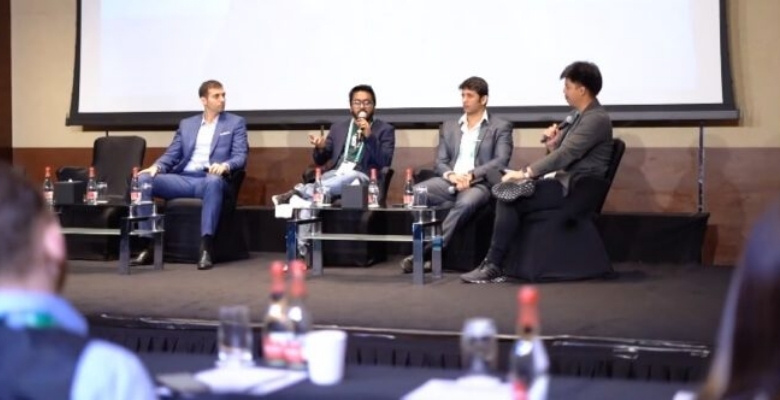Knowledge is best shared when people come together, and events are one of the strongest ways to make that happen. Many people hear about both but are not sure how they differ, which often makes them think about conference vs forum.
The main difference between a conference and a forum is their purpose and structure. A conference focuses on sharing research or updates through scheduled sessions and speakers, often in a formal setting. A forum encourages open discussion and problem-solving, usually in a smaller, more interactive, and casual environment.
Are you curious to know more about how these two formats stand apart in purpose, structure, and outcomes? If yes, keep reading because this article explains every key detail you need to understand the difference clearly.

Conference Vs Forum
A conference and a forum might sound similar to many people. Both bring people together, but they are not exactly the same. They have different ways of sharing ideas and information. Let’s explore the main differences between them in detail, so you can clearly understand the forum vs conference comparison.
| Aspect | Conference | Forum |
| Main Purpose | Sharing research, updates, or achievements | Discussing opinions, solving problems together |
| Structure | Fixed schedule with planned sessions and speakers | Open structure with free conversation and questions |
| Audience Size | Large, often from many locations | Small, easier for everyone to speak |
| Interaction | Mostly listening with limited Q&A | Active discussion and participant involvement |
| Duration | Several days with many sessions | Short, often a few hours |
| Topic Approach | Covers many topics within a field | Focuses on one specific topic in detail |
| Formality | More formal with dress code and a strict schedule | More casual and friendly atmosphere |
| Outcome | New knowledge, contacts, and opportunities | Clear opinions, possible solutions, shared understanding |
Main Purpose
The aim of each type of event can be quite different. A conference often focuses on sharing research, updates, or professional work. A forum gives more importance to discussions and opinions. One example is an international academic conference, which focuses mainly on presenting studies and findings.
Structure
Arrangements set the tone for how participants experience an event. Conferences usually follow a fixed schedule with planned speakers and sessions. Forums are more open in structure, allowing free conversation and questions. This difference sets them apart in style and flow.
Audience Size
The number of people attending can affect how the event feels. Conferences often have a large crowd, sometimes from many locations. Forums are usually smaller, making it easier to speak and share. The smaller setting often leads to more personal interaction among participants.
Interaction Level
How people join in plays a big role in these events. In conferences, people mostly listen and take notes from speakers. Forums invite everyone to join the conversation and respond. This higher level of interaction makes forums more active and engaging.
Event Duration
The time taken for each event can differ based on its goal. Conferences may go on for days with many sessions and talks. Forums usually take less time, often just a few hours. This makes forums easier to attend for busy participants.
Topic Approach
Handling of topics often defines the uniqueness of an event. Conferences explore multiple aspects of a field, while forums take one topic and examine it closely. This allows participants to see it more clearly and from various perspectives.
Formality Level
The level of seriousness and style can vary between these two formats. Conferences are more formal, often with professional dress codes and strict schedules. Forums are more casual, allowing open conversation. This makes forums feel friendlier and easier for many people.
Outcome
Outcomes of these events bring value to participants’ time. Conferences often provide new insights, connections, or opportunities. Forums, in contrast, conclude with opinions, solutions, and shared understanding. Both are beneficial, but the results vary by event type.
Conferences and forums both help people share and learn in different ways. Each one has its own style, purpose, and benefits for participants. Choosing the right one depends on your goal and interests. Understanding the difference between forum and conference makes that choice much easier.
How to Set Clear Goals for Your Conference and Forum?
Planning a conference or forum works well when your goals are clear. Without goals, planning becomes confusing and outcomes remain uncertain. Good goals bring direction and help everyone stay focused. Let us look at some simple ways to create them.
Topic focus
Start with a short line that explains the event theme. Keep the statement clear and linked to what you want people to learn. For example, the goals of an educational conference may center on knowledge sharing, while a business forum might aim at partnerships and deals. Avoid adding sessions that distract from your chosen theme.
Audience profile
Think about the kind of people you want at your event. Write down their role, their needs, and their knowledge level. This helps in deciding the best topics and speakers. Knowing your audience also makes your promotion much more effective.
Desired results
Plan for two or three things you want after the event. These can be signups, business leads, partnerships, or ideas shared. Keep each result realistic and achievable. Share these results with your planning team and make sure speakers understand them.
Success metrics
Decide how you will measure if the event worked well. Metrics can include attendance numbers, survey responses, or post-event signups. Be clear about when and how to check these results. Using simple measures will help you see if your goals succeeded.
Action plan
Create a list of tasks to reach each planned goal. Assign people to handle each task with a set deadline. Organize them on a simple timeline that runs until the event ends. Review weekly progress and make small changes when needed.
Clear goals make conferences easy to plan and simple to track. They guide your work and make the results more meaningful. Writing goals down helps the team stay focused and motivated. Share them openly to keep everyone working together.
Basics Budget Guide for Any Conference and Forum
Attending a conference or forum is exciting because it gives you the chance to learn new things and meet different people. But behind that excitement comes the responsibility of managing your money wisely. Without a budget, you might spend more than planned and feel stressed later. Let’s go through the main costs you should think about so you can stay prepared and enjoy the event fully.
- Registration Fee: This is usually the first cost you face, and it can vary depending on the event type, location, and how early you register.
- Travel Tickets: Whether it’s a flight, train, or bus, booking in advance often saves money and helps you secure better travel times.
- Hotel Stay: Choose a place that balances comfort, safety, and cost, and check if it is close to the event location to save on transport.
- Local Transportation: Include taxis, rideshares, or public transport in your budget so you’re not caught off guard by unexpected travel needs.
- Meals Not Covered: Many events provide some meals, but you’ll likely need to pay for others, so plan for breakfasts, dinners, or snacks.
- Daily Expenses: Small costs like coffee, bottled water, or souvenirs can add up quickly, so it’s smart to set a reasonable daily limit.
- Emergency Fund: Keep a little extra aside for sudden changes like extended stays, medical needs, or last-minute travel adjustments.
Planning your budget may seem like extra work, but it makes your trip easier and stress-free. You’ll know exactly what you can afford and where your money is going. It also keeps you ready for surprises without panic. With smart budgeting, you can focus on enjoying the event and making the most of your experience.
How Do Sessions Run in a Conference and a Forum?
Conferences and forums are distinct in their fundamental approach to session structure and audience engagement. While both aim to share knowledge, they do so with different core principles.
Conference Sessions
Conference sessions are primarily built around a model of information delivery. They are highly structured and follow a set, linear format.
- Speaker-Centric: A session typically features one or more expert speakers who present a prepared lecture, often using a slide deck. The content is meticulously timed to fit within a specific slot.
- One-Way Communication: The flow of information is largely from the presenter to the audience. Attendees listen and absorb the content.
- Limited Audience Interaction: Audience participation is usually limited to a brief question-and-answer (Q&A) period at the end of the presentation. A moderator or the speaker may field a few pre-screened questions from the audience.
Forum Sessions
Forum sessions are designed for collaborative learning and discussion. They are dynamic and rely on the active participation of everyone in the room.
- Audience-Centric: The session is centered on the audience’s interests and questions. The focus is on a two-way dialogue rather than a formal presentation.
- Moderator as a Facilitator: A moderator’s primary role is to guide the discussion, not to present content. They introduce the topic, pose questions to the group, manage time, and ensure that everyone has an opportunity to speak.
- Open Dialogue: The core of the session is a free-flowing exchange of ideas. Attendees are encouraged to share their experiences, opinions, and solutions, creating a collaborative problem-solving environment.
Hybrid: The Panel Discussion
Many modern conferences use a hybrid format known as a panel discussion to combine elements of both session types.
- Structured Discussion: A moderator guides a conversation among a small group of experts (the panelists). This provides a more dynamic and conversational feel than a traditional presentation.
- Moderated Interaction: The moderator ensures that the discussion stays on topic and that all panelists have a chance to contribute.
- Audience Engagement: Panel discussions almost always include a Q&A segment where the audience can submit questions, bridging the gap between a one-way lecture and an open forum.
Networking Style in a Conference and a Forum
Networking can look very different depending on the type of event. Conferences usually focus on large-scale connections with many people, while forums create smaller, more personal discussions.
Networking at a Conference
Conferences bring together large groups of people, often from different industries or backgrounds. The networking style is broad and happens in many casual settings.
- Coffee breaks: Quick and casual chats while grabbing coffee or snacks.
- Exhibition booths: Spaces where companies showcase products, and people stop by to connect.
- Social events: Evening parties, dinners, or mixers that make networking feel more relaxed.
- Large scale: You meet many people in a short time, but conversations may stay surface-level.
Networking in a Forum
Forums are smaller, more focused gatherings. The networking style here is structured and designed to encourage meaningful discussions.
- Small groups: Participants sit together in circles or clusters for direct interaction.
- Guided conversations: Moderators lead discussions on specific topics so everyone can take part.
- Focused connections: Networking is deeper, with more time to understand each other’s ideas.
- Interactive style: Instead of booths
What to Bring to a Conference and a Forum?
Attending a conference or forum means being prepared for a busy day filled with learning, meeting people, and taking notes. Carrying the right items helps you stay comfortable and organized. Let’s see the essentials that make your experience smoother.
- ID card: A valid identification card is often required at the entrance, and it makes registration easier. Keeping it handy saves time and avoids unwanted delays.
- Ticket or QR code: Entry often requires your ticket or a digital QR code. Having it ready avoids standing in long lines and reduces unnecessary stress.
- Phone charger: Long days can quickly drain your phone battery. A small charger or power bank ensures you stay connected throughout the event.
- Notebook: Writing notes by hand helps you remember key points. A notebook also works as a backup when your device battery runs out.
- Water bottle: Staying hydrated is important during long sessions. Carrying your own bottle saves money and keeps you refreshed without depending on vending stalls.
- Business cards: Exchanging cards makes networking simple and professional. Even a small stack of plain cards helps people remember you later.
- Comfortable bag: A light and sturdy bag keeps everything organized. It helps you carry items safely without feeling tired during the day.
Having the right things with you makes conferences less stressful and more productive. These small items keep you ready for learning, networking, and comfort. Pack them wisely so you can focus fully on the event.
How to Follow Up After a Conference and a Forum?
Attending a conference or forum is only the first step. What you do after the event can be even more important. Following up allows you to build stronger connections and clear next steps. Let’s see some simple ways you can do it.
Share Materials
Sending slides, notes, or helpful files shows you are serious and thoughtful. It reminds people about your talk and gives them something useful. Sharing also leaves a positive impression and makes your efforts stand out clearly.
Connect Contacts
Reaching out after collecting contacts is a very smart move. Write a quick thank-you message and remind them where you met. Adding a small detail from your chat makes it feel personal. This makes it easier to stay connected.
Send Summary
Writing a short and simple summary is very helpful for forums. It helps people recall important ideas and review the main outcomes. Even those who missed the session can catch up easily. A clear summary also saves everyone’s valuable time.
Agree Actions
Confirming next steps is one of the most useful follow-ups. Write down what was discussed and share with the group. This avoids future confusion and keeps everyone informed clearly. Following through builds trust and helps the group move forward.
Keep Engaged
Checking in from time to time makes connections stronger and lasting. You can share useful information, helpful updates, or small greetings. Relationships grow when people feel remembered and valued. Staying in touch ensures the event benefits never fade.
Following up gives more value to every conference and forum attended. It helps in making strong connections with the right people. Taking these steps makes the event worth your time. Always follow up to keep future opportunities open.
How to Give Helpful Feedback After a Conference and a Forum?
Sharing feedback after an event is important because it helps organizers know what worked well and what needs improvement. Good feedback makes future events more enjoyable for everyone. Let’s look at simple ways to give clear and useful feedback.
Short Surveys
Surveys are one of the easiest ways to share feedback. A few quick questions can be asked about the quality of the sessions, sound, space, and timing. Keeping it short encourages more people to respond and helps organizers see overall trends quickly.
Clear Ratings
Ratings make it simple to show what was good and what was not. For example, using a scale of one to five for each area, like sound or timing, helps organizers quickly spot where improvements are needed and where things worked.
Written Comments
Comments give more detail than numbers. This is where you can explain what you liked most and what could be better. Short, clear comments are most helpful because they show real opinions and give specific ideas to improve the event.
Honest Points
Being honest is important when giving feedback. If something did not work well, say it politely and suggest a better way. Organizers value truth more than empty praise. Honest points help them understand exactly what changes should be made next time.
Helpful Examples
Examples make feedback stronger and easier to understand. Instead of only saying “the sound was bad,” explain when or where the sound problem happened. Giving clear examples makes it possible for organizers to know what went wrong and fix it.
Giving helpful feedback is not just about pointing out mistakes. It is about sharing honest opinions in a clear way that can guide organizers. When feedback is simple, polite, and detailed, it makes future events much better for everyone.
FAQs About Conference Vs Forum
Attending or planning a conference or forum often brings many questions. People want to know how these events work and what makes them valuable. To make things clear, here are some common questions with helpful answers explained in simple words, including the difference between conference and forum, so you can choose the right one for your needs.
Who Usually Hosts a Conference or Forum?
A conference is often hosted by organizations, universities, or professional groups. Forums are mostly arranged by community groups, clubs, or smaller organizations. The host depends on the purpose of the event. Both types aim to bring useful discussions and learning.
Can Students Join Conferences and Forums?
Yes, many conferences and forums welcome students depending on the topic. Sometimes students join to learn new knowledge, present projects, or connect with professionals. Forums are often easier for students since discussions are open. Both can help in building real-world understanding.
Do Conferences Always Have Famous Speakers?
Not every conference features very famous speakers. Some invite well-known experts, while others have local professionals or researchers. What matters most is the quality of ideas shared. Even smaller names can give powerful and valuable talks during conferences.
Are Forums Only About Debates?
Forums are not only about debates, though debates can be part of them. They are mainly open discussions where everyone can share views. The goal is to exchange ideas and sometimes find solutions. It is more about talking together than arguing.
Which Event Is Better for Networking?
Both events allow networking, but in different ways. Conferences let you meet a larger number of people from many places. Forums give more personal and close interactions in smaller groups. Choosing depends on whether you want wide or deeper connections.
How Do Organizers Choose Forum Topics?
Organizers often select topics based on current issues or shared interests. Forums work best when they focus on one key theme. The goal is to create meaningful conversations where all participants can join in. This makes forums more engaging for everyone.
Do Conferences and Forums Cost Money?
Many conferences require a fee for registration, especially large ones. Forums may be free or have a small entry charge. Costs depend on the scale, location, and facilities provided. Always check details early to avoid unexpected financial surprises.
Conclusion
Understanding the differences helps you choose the right event for your needs. Conferences focus on sharing knowledge, research, and updates, while forums highlight discussions and solutions. Both are useful in unique ways, giving a clear answer to conference vs forum.
Planning your approach wisely can make either event more rewarding. Stay prepared with clear goals, manage your budget carefully, and follow up after the event. Keep these tips in mind, and best wishes for your future events.








